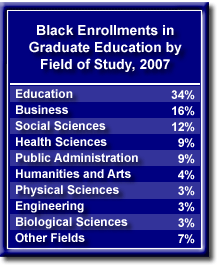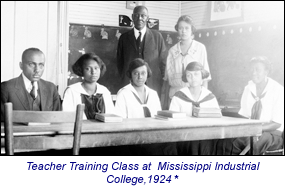Blacks Making Solid Progress in Graduate School Enrollments
 A new report by the Council of Graduate Schools finds that African Americans continue to make strong progress in enrollments in master’s and doctoral degree programs. A new report by the Council of Graduate Schools finds that African Americans continue to make strong progress in enrollments in master’s and doctoral degree programs.
The data shows that in 2007 there were 170,167 African Americans enrolled in graduate education in the United States. They made up 13 percent of all graduate students. This equals the black percentage of the U.S. population.
The progress has been steady and significant. From 1997 to 2007 black enrollments in graduate education have increased an average of 8 percent each year. This compares to an overall increase in graduate school enrollments of 2 percent a year.
Of the 170,167 African Americans who are enrolled in graduate school, 34 percent are enrolled in programs in the field of education. For whites, 29 percent of all graduate students are enrolled in education programs.
Business is the second most popular field for black graduate students, followed by social sciences and health sciences.

Black Sociologist to Head New Multicultural Center at Johns Hopkins
 Johns Hopkins University has announced that it will establish for the first time a multicultural center on campus. The center will be housed temporarily in office space in the Homewood Apartments building. But the center will have a permanent home in 2010 when it will move into Gilman Hall, which is currently used as offices for the department of the history of science and technology. The university is currently attempting to raise $3 million to support the multicultural center. Johns Hopkins University has announced that it will establish for the first time a multicultural center on campus. The center will be housed temporarily in office space in the Homewood Apartments building. But the center will have a permanent home in 2010 when it will move into Gilman Hall, which is currently used as offices for the department of the history of science and technology. The university is currently attempting to raise $3 million to support the multicultural center.
The new center will be under the direction of Katrina Bell McDonald, an associate professor of sociology at Johns Hopkins. In connection with her new duties, Dr. McDonald has assumed the title of associate dean for multicultural affairs.
Professor McDonald has been on the university’s faculty since 1994. She was only the second African-American female to be awarded tenure in the School of Arts and Sciences. Dr. McDonald is a graduate of Mills College. She holds a master’s degree in applied communication research from Stanford University and a Ph.D. in sociology from the University of California at Davis. She is the author of the 2006 book Embracing Sisterhood: Class, Identity, and Contemporary Black Women.

UNIVERSITY OF ALABAMA

BSW Chair, School of Social Work
The University of Alabama School of Social Work invites nominations and applications for a BSW Chair. An earned doctorate in social work, social welfare, or a closely related field; an MSW; and at least two years of post-MSW practice experience are required. Applicants should have a record of scholarly achievement, teaching experience, and service commensurate with years since receipt of the doctorate. This is a tenure-track position, however, there is an option for a three-year term, renewable contract for the successful candidate.
We seek candidates who will provide leadership in a growing BSW Program and will apply new perspectives on the synthesis of practice and research to the undergraduate curriculum. Applicants should expect to teach in all three degree programs; however, teaching priority will be in the BSW Program. We are invested in recruiting colleagues with experience with, knowledge of, and sensitivity to the needs of culturally diverse and underrepresented populations.
The University of Alabama has an enrollment of 25,000 students on a residential campus located in Tuscaloosa, a metropolitan area with good neighborhood schools, low crime rates, and excellent recreational opportunities.
The School of Social Work offers the BSW, MSW, and Ph.D. degrees. Faculty have excellent support for teaching and research; good relationships with federal, state, and local social service, health, and educational agencies; and a well-established distance learning programs. Please visit the School's website: socialwork.ua.edu.
The school encourages applications from women, persons of color, and members of other underrepresented groups. Salary is competitive. Typically, the BSW Chair also has a half-time summer administrative appointment. To apply please visit facultyjobs.ua.edu
Review of applications will begin immediately and continue until position is filled.

Black First-Year Enrollments Cut in Half at Auburn University
 There are 225 black freshmen at Auburn University in Alabama this fall. This is down more than 50 percent from a year ago when there were 474 African-American freshmen. Blacks are 5.5 percent of the first-year class at Auburn, which is a state-operated university. Remember, that blacks are 29 percent of the Alabama population. There are 225 black freshmen at Auburn University in Alabama this fall. This is down more than 50 percent from a year ago when there were 474 African-American freshmen. Blacks are 5.5 percent of the first-year class at Auburn, which is a state-operated university. Remember, that blacks are 29 percent of the Alabama population.
A major reason for the decline is a toughening of the admissions standards at Auburn. The average score of admitted students on the ACT college entrance examination rose from 24.8 to 25.9. The average black score on the ACT test is 16.9 on a scale of 1 to 36. There are not large numbers of black students in Alabama who score 26 or above on the ACT test.
Rust College Purchases the Campus of Its Neighbor
In 1905 the Christian Methodist Episcopal Church founded the Mississippi Industrial College in Holly Springs to “provide literary and industrial training to black youth, to train young men and women in Christian ideals, and to furnish a practical education and to make of them better citizens.”
The 63-acre campus grew to include 10 buildings. The college closed its doors in 1982 and the campus has been vacant ever since. Four of the original buildings have been designated National Historical Landmarks.
Rust College, the historically black educational institution, sits just across the highway from the campus of Mississippi Industrial College. Recently, Rust College purchased the campus for $1.1 million. Discussions are under way on what will be done with the property.

Three Blacks Win MacArthur Genius Awards
 The winners of MacArthur Foundation genius awards are scholars and artists — generally not well known to the American public — who have accomplished much in their chosen fields. The grants are designed to reward the recipients for their past work, to free them of financial obligations, and to enable them to take on new projects. Each awardee receives $500,000 distributed in quarterly installments of $25,000 over a five-year period. Recipients also receive health insurance for the duration of their MacArthur fellowships. Grantees are free to use the money any way they wish. There are no strings attached and no reporting requirements. The winners of MacArthur Foundation genius awards are scholars and artists — generally not well known to the American public — who have accomplished much in their chosen fields. The grants are designed to reward the recipients for their past work, to free them of financial obligations, and to enable them to take on new projects. Each awardee receives $500,000 distributed in quarterly installments of $25,000 over a five-year period. Recipients also receive health insurance for the duration of their MacArthur fellowships. Grantees are free to use the money any way they wish. There are no strings attached and no reporting requirements.
This year, of the 25 recipients, three blacks won MacArthur grants. Two are college graduates and one has two master’s degrees.
Here is a brief biographical sketch of each African-American winner:
Chimamanda Adichie, 31 years old, is a native of Nigeria who divides her time between the United States and Africa. An accomplished writer, she develops strong character portrayals in the backdrop of historical novels set in post-colonial Africa.
Will Allen is the founder of Growing Power, a non-profit organization that deals with cultivating healthy food and designing distribution networks within an urban setting. He operates a two-acre urban farm in Milwaukee and lectures throughout the country on his farming methods to bring low-cost, healthy food to residents of the inner city.
Over the past 40 years, Mary Jackson has devoted herself to basketry as an art form. Her art has been exhibited at the Smithsonian Institution, the Boston Museum of Fine Arts, the Museum of Arts and Design in New York, and other museums and galleries across the United States.
Black-White Differences in Support of Affirmative Action Admissions Programs
A new poll conducted by USA Today, ABC News, and Columbia University finds that 76 percent of black Americans support race-based affirmative action programs in college admissions. Only 33 percent of whites support race-based affirmative action.
When asked if they supported affirmative action in college admissions based solely on income level and not race, 82 percent of blacks were in favor of such programs. For whites, 59 percent supported income-based affirmative action admissions programs.
Appointments
 • Dorothy Bland, director of the division of journalism at Florida A&M University in Tallahassee, was appointed to the steering committee of the Hearst Journalism Awards Program. • Dorothy Bland, director of the division of journalism at Florida A&M University in Tallahassee, was appointed to the steering committee of the Hearst Journalism Awards Program.
 • Garland Burton Jr. was appointed director of business diversity programs at Wake Forest University in Winston-Salem, North Carolina. Burton, a graduate of St. Augustine’s College, was the director of the historically underutilized business program at the University of North Carolina at Chapel Hill. • Garland Burton Jr. was appointed director of business diversity programs at Wake Forest University in Winston-Salem, North Carolina. Burton, a graduate of St. Augustine’s College, was the director of the historically underutilized business program at the University of North Carolina at Chapel Hill.
 • John A. Rich, chair of the department of health management and policy and director of the Center for Academic Public Health Practice at Drexel University in Philadelphia, was elected to the board of trustees of Dartmouth College. • John A. Rich, chair of the department of health management and policy and director of the Center for Academic Public Health Practice at Drexel University in Philadelphia, was elected to the board of trustees of Dartmouth College.
Dr. Rich is a graduate of Dartmouth College and received his medical training at Duke University.
 • Karyn Scissum-Gunn was appointed provost at Alabama State University in Montgomery. She was professor and chair of the department of biological sciences. • Karyn Scissum-Gunn was appointed provost at Alabama State University in Montgomery. She was professor and chair of the department of biological sciences.
Dr. Scissum-Gunn holds bachelor’s and master’s degrees from Tuskegee University and a Ph.D. in molecular genetics from Auburn University.
• Andrena Coleman was named vice president for administrative services at Bennett College for Women in Greensboro, North Carolina. She was the director of the Charlotte Hawkins Brown Museum at historic Palmer Memorial Institute in Sedalia, North Carolina.
 • Alvin J. Schexnider was named interim president of Thomas Nelson Community College in Hampton, Virginia. Schexnider was chancellor of Winston-Salem State University from 1996 to 2000 and later served in several administrative positions at Norfolk State University. • Alvin J. Schexnider was named interim president of Thomas Nelson Community College in Hampton, Virginia. Schexnider was chancellor of Winston-Salem State University from 1996 to 2000 and later served in several administrative positions at Norfolk State University.
 • Paul A. Bryant was appointed vice president of student affairs at Delaware State University in Dover. He was acting vice president of student affairs at Eastern Connecticut State University in Willimantic. • Paul A. Bryant was appointed vice president of student affairs at Delaware State University in Dover. He was acting vice president of student affairs at Eastern Connecticut State University in Willimantic.
Dr. Bryant is a graduate of Elizabeth City State University in North Carolina. He holds a master’s degree from the University of North Carolina at Chapel Hill and an educational doctorate from Nova Southeastern University.
 • Jeremy I. Levitt, associate dean for international programs and distinguished professor of international law at Florida A&M University, was named chair of the International Technical Advisory Committee of the Liberian Truth and Reconciliation Commission. • Jeremy I. Levitt, associate dean for international programs and distinguished professor of international law at Florida A&M University, was named chair of the International Technical Advisory Committee of the Liberian Truth and Reconciliation Commission.
 • Cecilia Griffin Golden was named assistant provost at Southern University in Baton Rouge. She was president and CEO of Volunteers of America in Chesapeake, Pennsylvania. • Cecilia Griffin Golden was named assistant provost at Southern University in Baton Rouge. She was president and CEO of Volunteers of America in Chesapeake, Pennsylvania.
Dr. Golden is a graduate of the State University of New York at Geneseo. She holds a master’s degree from the University of Albany and a doctorate from the University of Buffalo.
* Teacher training class. Mississippi Industrial College, Neg. No. 2545. Papers and photographs of Jackson Davis, Albert and Shirley Small Special Collections, University of Virginia Library.
|
A Large Number of the Nation’s Black Colleges and Universities Enroll a Majority of Their Students From Low-Income Families
 Most of the nation’s highest-ranked colleges and universities enroll very few students who receive federal Pell Grant awards for low-income students. These scholarship grants are typically reserved for students whose families earn less than $40,000 annually. Most of the nation’s highest-ranked colleges and universities enroll very few students who receive federal Pell Grant awards for low-income students. These scholarship grants are typically reserved for students whose families earn less than $40,000 annually.
Yet at the nation’s historically black colleges and universities, an entirely different story emerges. At a majority of black colleges, two thirds or more of all enrolled students receive federal Pell Grants.
The latest data from the Department of Education reveals that there are six HBCUs at which more than 90 percent of all students receive Pell Grants. At Miles College and Paul Quinn College, virtually every enrolled student comes from a low-income family. At Voorhees College, Mississippi Valley State University, Livingstone College, LeMoyne-Owen College, and Morris College, more than 90 percent of the students are from low-income families.
There are only 15 HBCUs at which low-income students are not a majority of all students. Langston University in Oklahoma, at 27.1 percent, has the smallest percentage of low-income students among all the black colleges. At Morehouse College, Spelman College, and Howard University, three selective institutions, less than 40 percent of undergraduate students receive Pell Grants.
  |
 “The Bubba vote is there and it’s very real. There’s an awful lot of people in America, bless their heart, who simply are not emotionally prepared to vote for a black man.” “The Bubba vote is there and it’s very real. There’s an awful lot of people in America, bless their heart, who simply are not emotionally prepared to vote for a black man.”
— Dick Armey, former majority leader of the House of Representatives
|
Black Enrollments on the Rise at Flagship State Universities
Several of the nation’s flagship state universities are reporting increases in black enrollments this fall.
• At Indiana University in Bloomington, there are 1,749 black students enrolled this fall, the highest number ever recorded. Black enrollments are up 5 percent from a year ago.
• At the University of Kansas, black freshman enrollments are up 28 percent from a year ago. The number of African-American students on campus this year is the highest in the university’s history.
• At the University of Alabama in Tuscaloosa, black freshman enrollments are up a whopping 37 percent from a year ago. Blacks make up 10.3 percent of all first-year students.
• There are 2,194 black students at the University of Texas this fall. This is an increase of 4.1 percent from a year ago. Blacks are 5.6 percent of the freshman class and 4.4. percent of the entire student body.
• At the University of Colorado at Boulder, there are 472 black students enrolled, an increase of 9.3 percent from a year ago.
• But at Ohio State University in Columbus, the news is not encouraging. There are 363 black freshmen at Ohio State this fall, a decrease of 11 percent from a year ago.
Not All African-American College Students Are Supporting Barack Obama
It is believed that well more than 90 percent of all African-American voters will cast their presidential ballots this November for Barack Obama. It is expected that the percentage for Obama may be even higher among African-American college students.
 But Obama’s support is not universal. Sarah Perkins, a sophomore at Smith College in Northampton, Massachusetts, did not like John McCain and supported Mike Huckabee during the GOP primaries. In fact, as a dedicated social conservative, Perkins did not think she could ever support McCain. But she now has become a strong backer of the McCain-Palin ticket. But Obama’s support is not universal. Sarah Perkins, a sophomore at Smith College in Northampton, Massachusetts, did not like John McCain and supported Mike Huckabee during the GOP primaries. In fact, as a dedicated social conservative, Perkins did not think she could ever support McCain. But she now has become a strong backer of the McCain-Palin ticket.
Perkins, who is from Georgia, spent this past summer as a volunteer for the McCain campaign. She attended the Republican National Convention in Minnesota. There she met both Cindy and John McCain.
A member of the Smith College Republicans club, Perkins says, “The Republican Party is not perfect, but it is the perfect party for me.”
University of Florida Celebrates 50th Anniversary of Its Racial Integration
 On September 15, 1958, George H. Starke enrolled at the College of Law of the University of Florida. Starke was the first black student to ever enroll at the University of Florida. The university had agreed to admit a black student in order to end nine years of litigation and after a pitiful attempt to create a separate but equal law school for blacks. On September 15, 1958, George H. Starke enrolled at the College of Law of the University of Florida. Starke was the first black student to ever enroll at the University of Florida. The university had agreed to admit a black student in order to end nine years of litigation and after a pitiful attempt to create a separate but equal law school for blacks.
Today, 50 years after the initial racial integration of the university, more than 4,300 black students are now enrolled at the Gainesville campus. The university held a weeklong celebration commemorating the 50th anniversary of Starke’s enrollment in the law school. Starke was present and gave a speech on the steps of Tigert Hall.
Administrator at Delaware State University Takes One-Year Sabbatical to Work in International Food Policy for the State Department
 John L. Graham, assistant vice president for international affairs at Delaware State University, is taking a sabbatical. Dr. Graham is using the opportunity to take a one-year assignment with the U.S. State Department. He will be working in the office of the Bureau of African Affairs as an expert on international food policy. There he will advise State Department officials on issues such as drought, biotechnology, food security, and commodity pricing. John L. Graham, assistant vice president for international affairs at Delaware State University, is taking a sabbatical. Dr. Graham is using the opportunity to take a one-year assignment with the U.S. State Department. He will be working in the office of the Bureau of African Affairs as an expert on international food policy. There he will advise State Department officials on issues such as drought, biotechnology, food security, and commodity pricing.

INROADS

Summer Internships
INROADS is the nation’s largest non-profit source of salaried internships for excelling Black, Hispanic/Latino and Native American Indian college students. Students participate in these internships for 2-4 summers during college and earn $10-$25/hr. Most of them receive offers for full-time positions, upon graduation.
We work with the assistance of Educators and Faculty in identifying talent that will benefit from early career development and training for leadership in business, industry and the community at large.
Students who apply for an INROADS Internship are first trained, interviewed, and evaluated. Upon advancement in our process, students are next interviewed by INROADS Corporate Clients, who determine the right fit for the student. Such companies include United Technologies, Deloitte, PricewaterhouseCoopers, MetLife and many others. Upon placement, these students then become INROADS Interns and receive a PAID summer internship, with real-world work, in their major area of study.
INROADS Interns also receive:
• The potential to join the company, full-time upon graduation
• Scholarship information
• A corporate mentor
• Networking events with corporate executives and career-minded peers
• Free tutoring
• Year-round access to an INROADS advisor
Eligible students must:
• Be a U.S. Citizen or Permanent Resident
• Have two or more summers remaining prior to graduation
• Maintain a B or better grade point average (this requirement varies per internship)
• Intend to pursue a career in Business, Engineering, Retail Management, Technology, Health, Marketing or Sales
As you identify students who you feel may benefit from INROADS, please send them to Charles McLean, National Recruiter at cmclean@INROADS.org / (312) 371-3628.
You may also visit our website at www.INROADS.org/recruit/JBHE

New Private Fund Seeks to Counteract State Ban on Race-Based College Scholarships in Michigan
 In 2006 voters in Michigan approved Proposal 2, which eliminated race-sensitive admissions at the University of Michigan and other state universities in Michigan. Race-based scholarships administered by state-operated institutions of higher learning were also banned. In 2006 voters in Michigan approved Proposal 2, which eliminated race-sensitive admissions at the University of Michigan and other state universities in Michigan. Race-based scholarships administered by state-operated institutions of higher learning were also banned.
To offset the scholarship ban, the Imagine Fund was established to raise money to provide scholarships for minority students at state-operated as well as at private universities in Michigan. The fund is targeting Michigan businesses that have an interest in maintaining a racially diverse group of college graduates who will be available for management positions. Many Michigan corporations actively worked in opposition to Proposal 2.
The group is also soliciting donations online from the general public. People who are interested in contributing to the scholarship fund for minority students in Michigan can obtain more information by clicking here.
  |
62% Percentage of white parents of preschool children in 2007 who believe that it is important to teach their children about numbers.
43% Percentage of black parents of preschool children in 2007 who believe that it is important to teach their children about numbers.
source: U.S. Department of Education
|
In Memoriam
Jesse Edward Gloster (1915-2008)
Jesse Gloster, a Houston-area business leader and professor of economics at Texas Southern University for more than three decades, has died at a nursing home in Houston. He was 93 years old.
Founder of the first bank in the Houston area owned by African Americans, Gloster provided credit to many small black businesses. He joined the faculty at Texas Southern University in 1949 and continued to teach there until his retirement in 1982.
Dr. Gloster, a native of Ocala, Florida, was a graduate of Lincoln University of Pennsylvania. He held a master’s degree and a Ph.D. in economics from the University of Pittsburgh.
Honors and Awards
 • Syrulwa L. Somah, associate professor of construction management and occupational safety and health at North Carolina A&T State University, is the recipient of the Liberia Image Award for Lifetime Achievement. • Syrulwa L. Somah, associate professor of construction management and occupational safety and health at North Carolina A&T State University, is the recipient of the Liberia Image Award for Lifetime Achievement.
Dr. Somah is a graduate of the State University of New York. He holds a master’s degree from Liberal College University in Oklahoma and a Ph.D. in policy studies from the Union Institute in Cincinnati.
Grants
• Tuskegee University, the historically black educational institution in Alabama, received a $100,000 grant from the U.S. Department of Agriculture for a program to conduct international collaborative research, extension, and teaching.
• Ronnie Brewer, a member of the Utah Jazz of the National Basketball Association, made a $50,000 donation to the African-American studies program at the University of Arkansas. The funds will be used for scholarships for students in the program who are also interested in journalism.
• The U.S. Department of Housing and Urban Development has announced grants to 13 predominantly black colleges and universities totaling $9 million. The grants will be used to help revitalize the neighborhoods surrounding the campuses of these educational institutions.
Institutions receiving the grants are Miles College, Alabama A&M University, Stillman College, the University of Arkansas at Pine Bluff, Howard University, and Savannah State University. Also receiving grants are Southern University, North Carolina Central University, North Carolina A&T State University, Winston-Salem State University, Voorhees College, the Virginia University of Lynchburg, and West Virginia State University.
• Delaware State University, the historically black educational institution in Dover, received a $433,000 grant from the U.S. Department of Defense. The grant will be used for a physics department research project on an analysis of ionization reaction. The research has practical applications for surveillance satellites.
|
 .
.